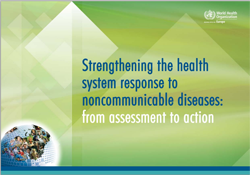Health systems response to NCDs
Noncommunicable diseases (NCDs) are the leading cause of death, disease and disability in the WHO European Region. The four major NCDs (cardiovascular disease, cancer, chronic obstructive pulmonary diseases and diabetes) account for nearly 86% of deaths and 77% of the disease burden. These diseases put increasing strain on the well-being of the population, health systems working to treat patients, and overall economic development. Loss of economic productivity as a result of NCDs is significant: it has been estimated that for every 10% increase in NCD mortality, economic growth is reduced by 0.5%.
Read more about health systems response to NCDsTop story
Nurse Ana Sajovic: delivering care in people’s homesAna Sajovic is a community nurse in a health care centre in Kranj, Slovenia. In recognition and appreciation of the contribution of nurses like Ana, WHO has designated 2020 – which is also the bicentenary of the birth of Florence Nightingale – the International Year of the Nurse and the Midwife.
Country assessments
 Better noncommunicable disease outcomes: challenges and opportunities for health systems. Country assessment guide (2014)
More country assessments
Better noncommunicable disease outcomes: challenges and opportunities for health systems. Country assessment guide (2014)
More country assessments
Featured event
 Health Systems Respond to NCDs: Experience in the European Region
Health Systems Respond to NCDs: Experience in the European Region
High-level regional meeting held 16–18 April 2018 in Sitges, Spain.
Good practice briefs
 Community action for health in Kyrgyzstan - hypertension detection
Community action for health in Kyrgyzstan - hypertension detection
Community Action for Health (CAH) in Kyrgyzstan is a health promotion programme built on direct citizen participation.
More good practice briefsProgramme brochure
 Strengthening the health system response to noncommunicable diseases: from assessment to action
Strengthening the health system response to noncommunicable diseases: from assessment to action
Available in English and Russian






